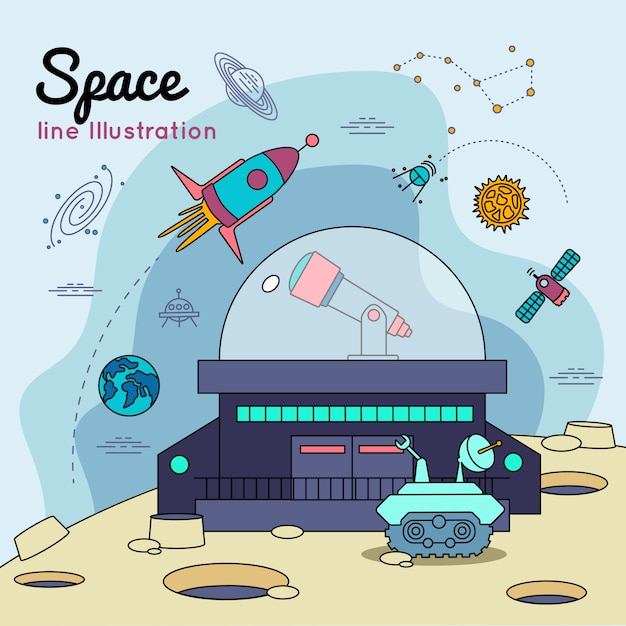Discover Fascinating Facts About Space

The largest volcano in the solar system is found on Mars, called Olympus Mons.
The longest-lasting storm in the solar system is the Great Red Spot on Jupiter, which has been going on for at least 400 years.
There are more stars in space than there are grains of sand on Earth.
Space is completely silent because there is no air for sound waves to travel through.
Uranus spins on its side, making it unique among the planets in our solar system.
The sun makes up 99.86% of the mass in the solar system.
The coldest place in the universe is the Boomerang Nebula, with a temperature of -272 degrees Celsius.
Astronauts in space grow taller due to the absence of gravity compressing their spines.
The speed of light is about 299,792 kilometers per second, which is roughly 7.5 times around the Earth in one second.
The Hubble Space Telescope can take images that are so precise, it would be equivalent to seeing a coin from 30 miles away.
There are more galaxies in the universe than there are stars in the Milky Way.
Saturn’s moon, Titan, has lakes of liquid methane on its surface.
The first living creatures sent to space were fruit flies, launched by the U.S. in 1947.
The International Space Station orbits the Earth at a speed of 28,000 kilometers per hour.
Space dust is constantly falling to Earth, accumulating in our atmosphere and contributing to the formation of shooting stars.
Discover Fascinating Facts About Space part 2
In space, flames are round and blue because they don’t have to contend with gravity’s pull.
The temperature on the moon ranges from extremely hot (100 degrees Celsius) to extremely cold (-173 degrees Celsius) due to its lack of atmosphere.
The Andromeda Galaxy is on a collision course with the Milky Way, but it won’t happen for about 4 billion years.
Space is not completely empty but contains tiny particles, gas, and radiation.
The first human-made object to reach space was the V-2 rocket launched by Germany in 19
The center of the Milky Way smells like raspberries and tastes like rum, according to astronomers who detected its chemical compounds.
The northern lights on Earth are caused by particles from the sun interacting with the Earth’s magnetic field.
The fifth-largest moon in the solar system is Earth’s moon.
There are over 3,700 confirmed exoplanets, which are planets outside our solar system.
Neutron stars are so dense that a teaspoonful of neutron star material would weigh about a billion tons on Earth.
One day on Venus is longer than one year because it takes longer for Venus to complete a rotation on its axis than it does to orbit the Sun.
The universe is estimated to be 13.8 billion years old.
The first woman to travel to space was Soviet cosmonaut Valentina Tereshkova in 1963.
Astronauts on the moon left reflectors that reflect lasers back to Earth, allowing scientists to measure the distance between the Earth and the moon with extreme precision.
The Sun is so large that 1.3 million Earths could fit inside it.
The footprints left by astronauts on the moon will stay there for millions of years due to the lack of atmosphere and erosion.
If you could drive a car straight up into space, it would only take about an hour to reach outer space.
There are more atoms in a single grain of sand than there are stars in the observable universe.
Space telescopes are used to observe the universe without the interference of Earth’s atmosphere.
The Sun is actually white, but its light appears yellow due to Earth’s atmosphere scattering shorter wavelengths of light.
The fastest-spinning planet in the solar system is Jupiter, completing a rotation in less than 10 hours.
Pluto is smaller than several moons in the solar system, including Earth’s moon.
The sound from the explosion of the Krakatoa volcano in 1883 was so loud that it could be heard 3,000 miles away.
The majority of the universe is made up of dark matter and dark energy, which cannot be directly observed.
In the vacuum of space, a penny and a feather would fall at the same rate because there is no air resistance.
The term astronaut comes from the Greek words astron meaning star and nautes meaning sailor.
The Voyager 1 spacecraft, launched in 1977, is the farthest man-made object from Earth, currently over 21 billion kilometers away.
The International Space Station weighs about 420,000 kilograms, roughly the equivalent of 256 cars.
Mars has the tallest volcano and the deepest, longest canyon in the solar system, called Valles Marineris.
The black holes are regions in space where gravity is so strong that nothing, not even light, can escape their pull.

